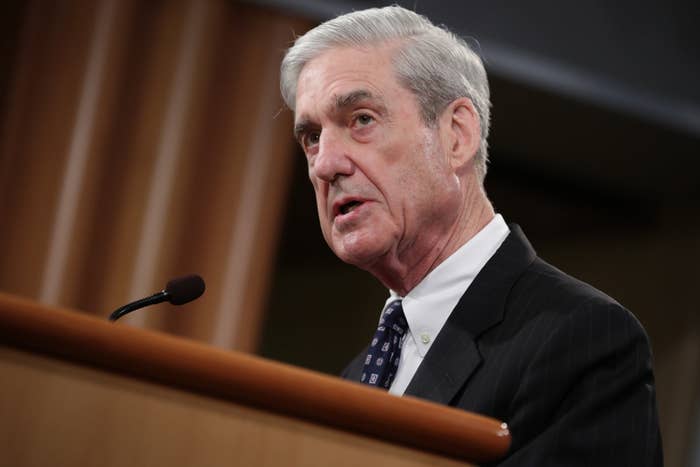
WASHINGTON — In his first and only public remarks as special counsel to date, Robert Mueller explained Wednesday that his office did not reach a decision about whether President Donald Trump committed obstruction because it wasn't an option — "long-standing" Justice Department policy barred charges against a sitting president.
Commentators on Wednesday questioned whether Mueller's remarks conflicted with earlier statements from Attorney General Bill Barr about the role the DOJ policy played in Mueller's process. At the time, Barr's statements were interpreted as downplaying the role the policy played in Mueller's decision-making.
But Mueller's comments on Wednesday appeared to bolster Barr's version of events — or, at least, they didn't directly contradict it. Mueller did not say that he would have recommended criminal charges against Trump but for that policy. He said his team couldn't exonerate the president based on the evidence it had, but stressed that his office never got to the point of trying to answer the question of whether Trump actually committed a crime.
Mueller was referring to a 2000 opinion from the department's Office of Legal Counsel — opinions from that office remain binding until they're withdrawn or overruled. Mueller, in his report, quoted a section of the opinion that said that charging a sitting president would undermine the executive branch's ability "to perform its constitutionally assigned functions." In his remarks Wednesday, he noted that the special counsel's office, as part of the Justice Department, was bound by that opinion.
During a press conference in April shortly before a redacted version of Mueller's final report was released, Barr told reporters that he and other senior DOJ officials met with Mueller on March 5 and asked him if he would have found Trump committed a crime but for the DOJ policy. According to Barr, Mueller said that was "not his position," and made clear that his office did not make a decision either way.
In early May, when Barr testified before the Senate Judiciary Committee, Sen. Chuck Grassley asked Barr about his conversation with Mueller. Barr replied that Mueller "reiterated several times in a group meeting that he was not saying that but for the OLC opinion he would have found obstruction."
Mueller on Wednesday repeated language from his report that the special counsel's office did not exonerate the president — if they had "confidence" Trump "clearly" didn't commit a crime, they would have said so, he said. But he also reiterated that his team "did not, however, make a determination as to whether the president did commit a crime."
"The special counsel's office is part of the Department of Justice and, by regulation, it was bound by that department policy," Mueller said. "Charging the president with a crime was therefore not an option we could consider."
He said later in his remarks: "We concluded that we would not reach a determination — one way or the other — about whether the president committed a crime. That is the office's final position and we will not comment on any other conclusions or hypotheticals about the president."
Mueller ultimately presented evidence on both sides of the obstruction issue in his report, while noting there was "substantial evidence" Trump had engaged in potentially obstructive acts. Barr, in consultation with other Justice Department officials, reviewed the information Mueller's office had compiled and decided to conclude that it did not support finding the president committed a crime.
Mueller did appear to contradict Barr on one point. At the May hearing, Grassley asked Barr, "If the special counsel found facts sufficient to constitute obstruction of justice, would he have stated that finding?" Barr replied, "If he had found that, then I think he would state it, yes."
But Mueller said Wednesday that his office did not reach any decision about whether Trump committed a crime, and wouldn't have accused him of wrongdoing.
"Beyond department policy, we were guided by principles of fairness," Mueller said. "It would be unfair to potentially accuse somebody of a crime when there can be no court resolution of an actual charge," he said.
Several Democrats called on Barr to resign over his handling of the end of Mueller's investigation. Democrats criticized how Barr described Mueller's report before it was released, particularly after the Washington Post obtained a letter from Mueller that pushed back on Barr's characterization. Members accused Barr of downplaying Mueller's findings on obstruction in order to protect the president.

